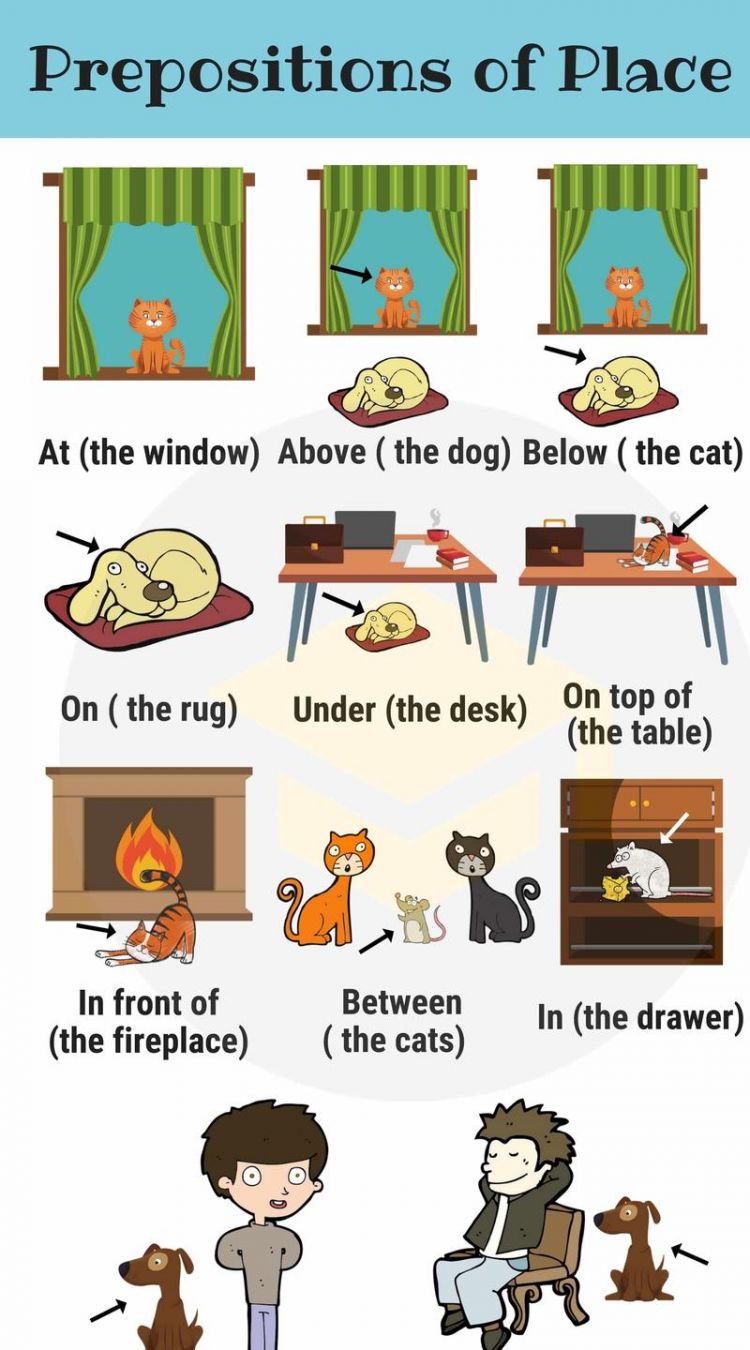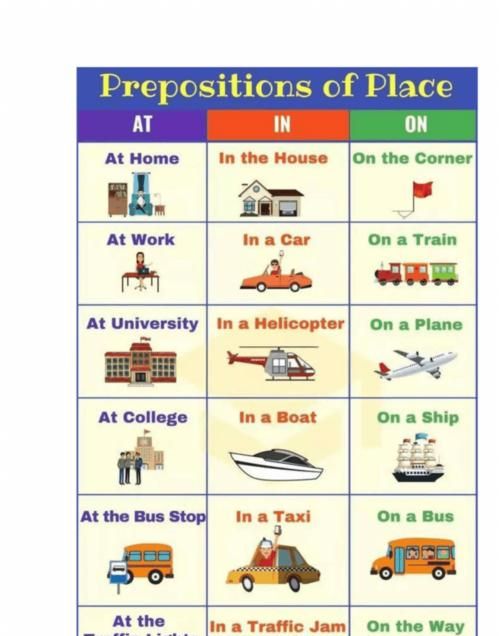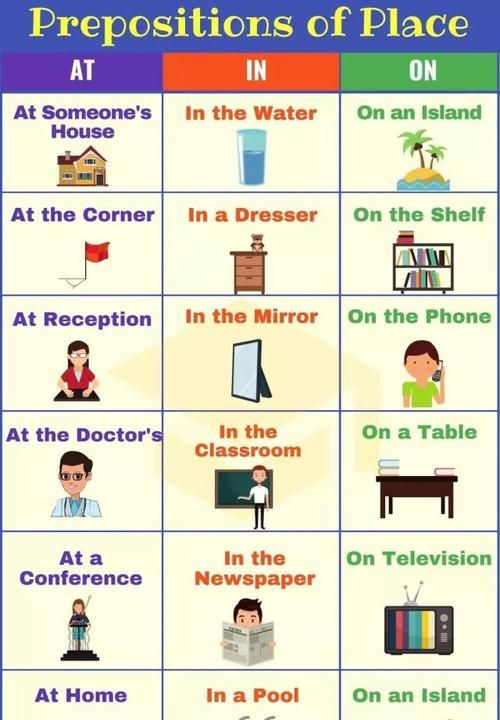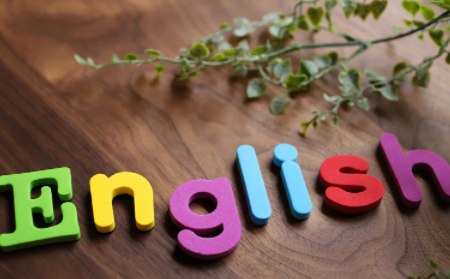本文目录
七年级英语介词的用法归纳
介词又称作前置词,表示名词、代词等与句中其他词的关系,在句中不能单独作句子成分。那么,英语介词的用法有哪些呢?下面和我一起来看看吧!
什么是介词
介词又称作前置词,表示名词、代词等与句中其他词的关系,在句中不能单独作句子成分。
介词后面一般有名词、代词或相当于名词的其他词类、短语或从句作它的宾语,表示与其他成分的关系。介词和它的宾语构成介词词组,在句中作状语,表语,补语,定语或介词宾语。介词可以分为时间介词、地点介词、方式介词、原因介词、数量介词和其他介词。
介词一般用于名词或者代词前面,表示该词与句中其他成分的关系。介词后面的名词或代词称为介词宾语(如果是人称代词,则要用宾格)。介词和介词宾语合在一起构成介词短语。
英语介词的用法有哪些
(1)许多介词+时间名词可以表示时间概念,但要注意有些时间名词前不接介词。如: next day、yesterday afternoon、the night before等。
(2)介词与“疑问词+动词不定式”连用。通过下面的两个例子,相信你能更好的理解它。He gave me some advice on how to study English.
he has no money to buy food with.
(3)介词与副词连用
与介词连用的副词多为时间和地点副词,且大都已转化成名词,如:near here;after today;for ever;until/till now等。
(4)介词与形容词连用
与介词连用的形容词通常是不作介词宾语的。如:in particular; far from perfect ; in general; in shor
(5)介词与介词短语连用个别介词,如from, until, but, except, instead of等后面可以跟介词短语来充当其宾语。
介词的分类
如果按照复杂程度分,介词可以分为单个的介词、复合介词、短语介词
1. 单个的介词,如: in,on,with,by,for,at,about,under,of 等;
2. 复合介词,例如:into,within,throughout,inside,outside,without 等;
3. 短语介词,如:out of, because of, away from, on top of, ever since, next to, according to, in front of 等。

英语介词用法最全总结小学
介词用法口诀1:
早、午、晚要用 in,at 黎明、午夜、点与分。
年、月、年月、季节、周,阳光、灯、影、衣、帽 in。
将来时态 in ... 以后,小处 at 大处 in。
有形 with 无形 by,语言、单位、材料 in。
特征、方面与方式,心情成语惯用 in。
介词 at 和 to 表方向,攻击、位置、恶、善分。
早、午、晚要用 in
例:
in the morning 在早上
in the afternoon 在下午
in the evening 在晚上
in the day 在白天
at 黎明、午、夜、点与分
例:
at dawn, at daybreak 在黎明时候
at noon 在中午
at night 在夜间
at midnight 在午夜
以上短语都不用冠词
at six o'clock 在6点钟
at 7:30 (seven thirty) 在7点半
at half past eleven 在11点半
at nine fifteen 在9点15 分
at ten thirty a.m. 在上午10点30分也可以写成 seven to five 5点差7分(半小时以上)
five minutes after two 2点过5分
at a quarter to two 1点45分
at the weekend 在周末
年、月、年月、季节、周,即在“某年”,在“某月”,在“某年某月” (但在某年某月某日则用 on),在四季,在第几周等都要用 in。
例:
in 1986 在1986 年
in 1927 在1927 年
in April 在四月
in March 在三月
in December, 1986 1986年12月
in July, l983 1983年7月
in spring 在春季 in summer 在夏季
in autumn 在秋季 in winter 在冬季
in the fist week of this semester 这学期的第一周
in the third week 在第三周
阳光、灯、影、衣、冒 in,即在阳光下,在灯下,在树阴下,穿衣、着装、冒雨等都要用 in。
例:
Don't read in dim light. 切勿在暗淡的灯光下看书。
They are reviewing their lessons in the bright light. 他们在明亮的灯光下复习功课。
They are sitting in the shade of a tree. 他们坐在树阴下乘凉。
a prisoner in irons 带着镣铐的囚犯
He went in the rain to meet me at the station. 他冒雨到车站去接我。
The poor dressed (clothed) in rags in old society. 旧社会穷人们衣衫褴褛。
以及:
in the bright sunlight 在明亮的阳光下
a merchant in disguise 乔装的商人
the woman in white (black, red, yellow) 穿着白(黑、红、黄)色衣服的妇女
in uniform 穿着制服
in mourning 穿着丧服
in brown shoes 穿着棕色鞋
in his shirt sleeves 穿着衬衫
将来时态 in … 以后
例:
They will come back in 10 days. 他们将10天以后回来。
I'll come round in a day or two. 我一两天就回来。
We'll be back in no time. 我们一会儿就回来。
Come and see me in two days' time. 两天后来看我。(从现在开始)
After … (从过去开始)
小处 at 大处 in
例:
Li and I arrived at Heishan county safe and sound, all is well. Don't worry.
李和我平安地到达黑山县,一切很好,勿念。
I live in a great city (big city), my sister lives at a small town while my parents live at a village. 我住在大城市,我姐姐住在一个小城镇,而我的父母则住在农村。
I'm in Liaoning, at Anshan. 我住在辽宁省鞍山市.
有形 with 无形 by,语言、单位、材料 in
例:
The workers are paving a road with stone. 工人们正用石子铺路。(有形)
The teacher is correcting the paper with a new pen. 这位教师正用一支新笔批改论文。(有形)
“Taking Tiger Mountain by Strategy”is a good opera. <<智取威虎山>>是—出好戏。(无形)
The product is separated by distillation into gasoline and gas oil. 这种产品是用蒸馏分离出汽油和粗柴油。(表示方式、手段、方法——无形)
I really can't express my idea in English freely in-deed.
我确实不能用英语流利地表达我的思想。(表示某种语言用 in)
I wrote a novel in Russian. 我用俄语写了一本小说。(同上)
The kilometer is the biggest unit of length in the metric system.
公里是米制中最长的长度单位。(表示度、量、衡单位的用 in )
The length is measured in meter, kilometre, and centimetre.
长度是以米、公里、厘米为单位来计算的。(同上)
This board was cast in bronze not in gold. 这个牌匾是铜铸的,不是金铸的。
特征、方面与方式、心情、成语惯用 in
特征或状态:
例:
The Democratic Party was then in power. 那时民主党执政。
They found the patient in a coma. 他们发现病人处于昏迷状态。
He has not been in good health for some years. 他几年来身体一直不好。
Many who came in despair went away in hope. 许多人带着绝望情绪而来,却满怀希望而去。
The house was in ruins. 这房屋成了废墟。
The poor girl was in tears. 这个贫苦女孩泪流满面。
Her clothes were in rags. 她的衣服穿破了。
His shoes were in holes. 他的鞋穿出窟窿了。
I only said it in fun. 我说这话只是开玩笑的。
She spoke in grief rather than in anger. 与其说她讲得很气愤,不如说她讲得很伤心。
还有一些短语也用 in,如:
in jest 诙谐地,in joke 开玩笑地,in spite 恶意地, in fairness 公正地,in revenge 报复, in mercy 宽大,in sorrow 伤心地等。
His mind was in great confusion. 他脑子里很乱。
Today everybody is in high spirits and no one is in low ebb.
今天大家都兴高采烈,没有一个情绪低落的。
She and her classmates are in flower ages. 她和她的同学都正值妙龄。
The campaign was in full swing. 运动正值高潮中。
方面:
例:We accepted the item in principle. 我们在原则上接受了这个条款。
They are never backward in giving their views. 他们从来不怕发表自己的意见。
The backward area has achieved self-sufficient in grain.
这个落后的地区在粮食方面已能自给。
A good teacher must be an example in study. 一个好的教师必须是学习的模范。
方式:
例:
All the speeches were taken down in shorthand. 所有报告都用速记记录下来了。
The Party has always educated us in the spirit of patriotism and internationalism.
党一贯以爱国主义和国际主义精神教育我们。
如下成语惯用 in
例:
in all 总计
in advance 事前
in the meantime 与此同时
in place 适当地
in hopes of(或 in the hope of) 怀着……希望
in connection with 和……有关
in contact with 和……联系
in addition to 除……以外
in case of 倘若,万一
in conflict with 和……冲突
in force 有效的,大批
in depth 彻底地
in regard to 关于
in the neighborhood of 大约、邻近
in retrospect 回顾,一想起
in behalf of 代表……利益
in the least 一点,丝毫
in alarm 惊慌、担心
in the opinion of 据……见解
in the long run 从长远说来
in one's opinion 在……看来
in word 口头上
in a word 总之
in vain 无益地, 白白地
in case 如果,万一,以防
in detail 详细地
in haste 急急忙忙地
in conclusion 总之
in spite of 尽管
in other words … 换句话说
in return 作为回报
in the name of 以……名义
be confident in 对……有信心
be interested in 对……感兴趣
in doubt 怀疑
in love 恋爱中
in debt 负债
in fun (jest、joke) 玩笑地
in hesitation 犹豫不决
in wonder 在惊奇中
in public (secret) 公开他(秘密地)
in a good humour 心情(情绪)好
介词 at、to 表方向,攻击、位置、善、恶、分”
介词 at 和 to 都可以表示方向; 用 at 表示方向时,侧重于攻击的目标,往往表示恶意;用to 表示方向时,突出运动的位置或动作的对象,侧重表示善意。
试比较下列各句:
1. A.She came at me. 她向我扑过来。
B.She came to me. 她向我走过来。
2.A.Jake ran at John. 杰克向约翰扑过去。
B.Jake ran to John. 杰克朝约翰跑去。
3.A. He rushed at the woman with a sword. 他拿着剑向那妇女扑过去。
B. He rushed to the woman with a sword. 他带着剑向那妇女跑过去。
4.A.He shouted at the old man. 他大声喝斥那老人。
B. He shouted to the old man. 他大声向那老人说。
5.A.I heard her muttering at Xiao Li. 我听见她在抱怨小李。
B.I heard her muttering to Xiao Li. 我听见她在同小李低声说话。
6.A. She talked at you just now. 她刚才还说你坏话呢。
B.She talked to you just now. 她刚才还同你谈话呢.
7.A.She threw a bone at the dog. 她用一块骨头砸狗。
B.She threw a bone to the dog. 她把一块骨头扔给狗吃。
8.A.He presented a pistol at me. 他用手枪对着我。
B.He presented a pistol to me. 他赠送我一支手枪。
介词用法口诀2:
日子、日期、年月日,星期加上早、午、晚,
收音、农场、值日 on,关于、基础、靠、著论。
着、罢、出售、偷、公、假,故意、支付、相反,准。
特定时日和“一……就”,on 后常接动名词。
年、月、日加早、午、晚,of 之前 on 代 in。
步行、驴、马、玩笑 on,cab,carriage 则用 in。
at 山脚、门口、在当前,速、温、日落、价、核心。
工具、和、同随 with,具有、独立、就、原因。
就……来说宾译主,对、有、方状、表细分。
海、陆、空、车、偶、被 by,单数、人类 know to man。
this、that、tomorrow,yesterday,next、last、one。
接年、月、季、星期、周,介词省略已习惯。
over、under 正上下,above、below 则不然,
若与数量词连用,混合使用亦无关。
beyond 超出、无、不能,against 靠着,对与反。
besides,except 分内外,among 之内 along 沿。
同类比较 except,加 for 异类记心间。
原状 because of, owing to,due to 表语形容词。
Under 后接修、建中,of,from 物、化分。
Before,after 表一点, ago,later 表一段。
before 能接完成时,ago 过去极有限。
since 以来 during 间,since 时态多变换。
与之相比 beside,除了 last but one。
复不定 for、找、价、原,对、给、段、去、为、作、赞。
快到、对、向 towards,工、学、军、城、北、上、南。
but for 否定用虚拟,复合介词待后言。
ing 型由于鉴,除了除外与包合。
之后、关于、在……方面,有关介词须记全。
in 内 to 外表位置,山、水、国界 to 在前。
英语中的介词搭配比较复杂,是初学英语的难点。本文讲时态的使用制成口诀,可以帮助大家更快的掌握介词的使用方法。如大体掌握如上介词用法口诀,就不易出错。后面会有文章对口诀的使用做专门解释。
日子、日期、年月日,星期加上早午晚; 以下皆用 on。
例:
on October the first 1949 1949年10月1日
on February the thirteenth l893 1893年2月13日
on May the first 5月1日
on the first 1号
on the sixteenth 16号
on the second of January 或 on January the second 1月2日
on a summer evening 在夏天的一个夜晚
on Boxing Day 在节礼日(圣诞节次日)
on New Year's Day 在元旦
on my birthday 在我的生日
但 in the Christmas holidays 在圣诞节假期; in the eighteenth century 在十八世纪; in ancient times 在古代; in earlier times 在早期; in modern times 在现代,则用 in,at the present time 现在,at the present day 当今 则用 at。
on May Day 在“五·一”节
on winter day 在冬天
on December 12th 1950 1950年12月12日
on Sunday 在星期天
on Monday 在星期一
on Tuesday morning 星期二早晨
on Saturday afternoon 星期六下午
on Friday evening 星期五晚上
但 last night 昨夜;in the evening 在晚上; on time 准时,in time 及时,等则不同。
年月日,加早午晚,of 之前 on 代 in
例:
on the morning of 18th 18日早晨
on the evening of 4th 4日晚上
On the eve of their departure they gave a farewell banquet and their head gave a farewell speech. 他们在临行前夕举行了一次告别宴会,他们的团长发表了告别讲话。
收音、农场,值日 on
例:
Did your supervisor like the story over (or on) the radio last night?
您的导师喜欢昨天从收音机里听到的故事吗?
I heard the news over (or on) the radio. 我从收音机里听到了这一条消息。
talk over the radio 由无线电播音
on TV 从电视里……
hear something on the wireless 在无线电里听到
My brother works on an Army reclamation farm. 我哥哥在一个军垦农场工作。
The students are working on a school farm. 学生们正在校办农场劳动。
This is a farmer's house on a farm. 这是农场的农舍。
Who is on duty, today? 今天谁值日?
We go on duty at 8 a.m. 我们上午8点钟上班 。
关于、基础、靠、著论
例:
This afternoon we are going to listen to a report on the international situation.
今天下午我们要听关于国际形势的报告。
Professor Shen will give us a talk on traveling in America.
申教授将给我们做关于美国之行的报告。
You are wrong on all these issues. 在这些问题上你的看法都错了。
The belief is based on practical experience. 这种信念是以实际经验为基础的。
Theory must be based on practice. 理论必须以实践为基础。
The people in the south live on rice. 南方人主食大米。(靠)
The citizens live on their salaries. 城市人靠薪金生活。
You can't afford luxuries, on an income of 100 yuan a month.
靠月薪100 元的收入,你是买不起奢侈品的。
Her pet dogs were fed on the choicest food. 她用精饲料喂养她心爱的狗。
He is just a scrounger, who lives on other people. 他正是一个小偷,专靠损害别人过日子。
Keep the kettle on the boil (=boiling). 让水壶的水一直开着。
The enemy are on the run (=running). 敌人在逃跑。
On 后接 the 加上一个作名词的动词,其意义与现在分词所表达的相近。 类似例子很多如:
on the march 在行军中,on the mend 在好转中,on the prowl 徘徊,on the move 活动中,on the scrounge 巧取豪夺(俚语),on the go 活跃,忙碌,on the lookout 注意, 警戒,on the watch 监视着。on the hop 趁不备抓住某人等等。
on the People's Democratic Dictatorship 《实践论》和《矛盾论》
on the People's Democratic Dictatorship 《论人民民主专政》
“on Coalition Government”《论联合政府》
着、罢、出售、偷、公、假,故意、支付,相反、准
注:口诀中的“着”是指着火,“罢”指罢工,“偷”指偷偷地,“公”指出差、办公事;“假”指休假,“准”指准时。
例:
The house next to mine was on fire. 我邻居的房子着火了。
The workers of the railway station were on strike. 铁路工人罢工了。
Grapes and big water melons from Sinkiang are on sale on a large sale.
新疆葡萄和西瓜大量上市了。
Do something on the sly (quiet). 秘密地(暗地里,偷偷地)做某事。
I've come here on business. 我是有公事来的。
They went to Bern on a mission. 他们到伯尔尼去执行一项使命。
They have been away on a long trip. 他们出去做一次长途旅行。
I'll go home on leave next month. 下月我将休假回家。
I went on business to Shanghai. I did not take leave. 我是公出去上海的,不是不告而别。
She came to see you on purpose. 她是专程来看你的。
He came here on purpose to discuss it with you. 他到这来是要与你讨论这件事的。
“This lunch is on me.”“这顿午饭我付钱。”
“No. let's go Dutch.”“不,还是各付各的。”
On the contrary, it was very easy to understand. 相反,这事儿很容易理解。
P1ease come on time. (on schedule). 请准时来。
注:in time 是“及时”的意思。
The train arrived on schedule. 火车准时到达。
特定时间和“一……就”,左右 on 后动名词
例:
Gases expand on heating and contract on cooling. 气体加热时膨胀,冷却时收缩。(特定时间)
On entering the room, he found his friends dancing in high spirits.
一进屋,他就发现他的朋友们在愉快地跳舞。
On reaching the city he called up Lao Yang. 一到城里他就给老杨打了一个电话。
I'll write to him on hearing from you. 我接到你的来信就给他写信。(一……就)
以及 on the left, right 向左向右,on the stair 在台阶上等

英语介词of的用法总结
在学习英语的过程中,总是会遇到些介词上的用法问题,下面我就为大家来整理一下常见的英语介词的用法。
常见的英语介词用法
表示方位的介词:in, to, on
表示计量的介词:at, for, by
表示材料的介词:of, from, in
表示工具或手段的介词:by, with, on
表示关于的介词:of, about, on
表示好像或当作的介词:like, as
表示除某人某物外的介词:besides, excep
介词用法口诀
早、午、晚要用 in,at 黎明、午夜、点与分。
年、月、年月、季节、周,阳光、灯、影、衣、帽 in。
将来时态 in ... 以后,小处 at 大处 in。
有形 with 无形 by,语言、单位、材料 in。
特征、方面与方式,心情成语惯用 in。
介词 at 和 to 表方向,攻击、位置、恶、善分。
早、午、晚要用 in
介词的种类
(1) 简单介词:about, across, after, against, among, around, at, before, behind, below, beside, but, by, down, during, for, from, in, of, on, over, near, round, since, to, under, up, with等等。
(2) 合成介词:inside, into, outside, throughout, upon, without, within
(3) 短语介词:according to, along with, apart from, because of, in front of, in spite of, instead of, owing to, up to, with reguard to
(4) 分词介词:considering, reguarding, including, concerning
介词in的常见用法
1.动词+in
a)动词+ in
believe in信任, break in碎成,bring in引起;产生;带来, call in下令收回, fill in填充,get in收获, hand in上缴, involve in涉及, lie in在于, result in导致, share in共享,succeed in成功, take in卷起;订阅, turn in归还当局。
b)动词+sb./time/money+ in
help sb. in帮助某人做某事, spare time/money in匀出时间或钱做某事,spend time/money in花时间或钱做某事,waste time/money in浪费时间或钱做某事。
2. be +形容词+ in
be active in活跃于,be absorbed in专心致志, be busy in忙碌, be born in出生于,be concerned in牵涉, be clothed in穿着, be disappointed in对…失望,be diligent in勤于, be experienced in在…有经验, be employed in任职于,be engaged in忙碌, be expert in某方面的专家, be excellent in在…优秀,be interested in对…有兴趣, be lacking in缺乏, be rich in富有,be slow in迟缓, be successful in在某方面成功, be skilled in精于,be strict in严于, be weak in弱于。
3. in +名词
in advance提前,in all总共,in balance总而言之,in bed卧床,in body亲自,in brief简明扼要,in case万一, in charge主管,in danger有危险, in debt负债, in despair失望,in force大量地;有效,in full全部地, in flower开花,in general一般说来,in itself本身, in love恋爱, in order井然有序, in person亲自,in public公开地, in progress有进展, in practice从实践上看, in rags穿着破衣,in research探索, in return作为报答,in ruins一片废墟,in short总之,in theory从理论上看, in trouble有麻烦, in tears眼泪汪汪,in time及时, in turn按顺序, in vain白白地,in view看得见。

英语介词有哪些及其用法
英语介词及用法是: in/on/to。
1、in表示在某地范围之内。
Fujian is/lies in the south of China.福建在中国的南部。
2、on表示与某地相邻或接壤。
Mongolia is/lies on the north of China.蒙古国位于中国北边。
3、to表示在某地范围之外(不接壤)。
Japan is/lies to the east of China.日本位于中国的东面。

时间或地点介词in、on、at的用法区别:表示时间时, in表示在一段时间里(在将来时句子中则表示在一段时间之后), on表示在具体的某一天或者某天的上下午等, at表示在某个时刻或者瞬间;表示地点时, in表示在某个范围之内, on表示在某个平面上或与一个面相接触,at则表示在某个具体的场所或地点。
如:He was born on the morning of May 10th.(他出生于五月十日的早晨)/ I usually get up at 7:00 in the morning.(我通常在早上的七点钟起床) / His glasses are right on his nose.(他的眼镜就架在他的鼻子上)/ He is at the cinema at the moment.(此刻他正在电影院)。
以上就是关于英语中各种介词的用法 ,七年级英语介词的用法归纳的全部内容,以及英语中各种介词的用法 的相关内容,希望能够帮到您。

